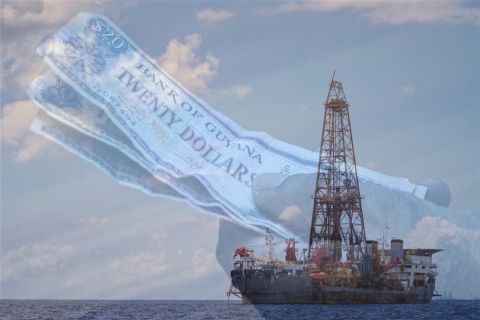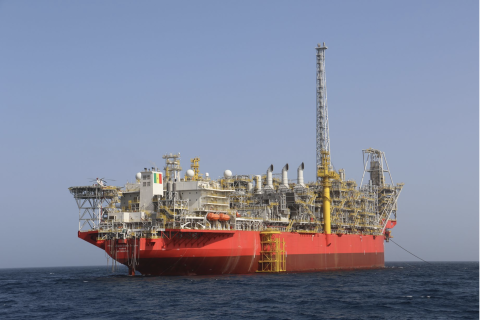It's good news for those who were short on FGH, the stock of Gulfport, Mississippi-based <$iFriede Goldman Halter Inc. >, but bad news for those who actually own it. The offshore-fabrication and marine-engineering company was nearer at press time to filing for Chapter 11 bankruptcy protection. <$iFoothills Capital Corp. > had filed a demand for immediate payment from Friede of $86 million, plus interest, within five days. The company was already unable to pay around $4 million in interest on its $185-million 4.5% convertible subordinated notes. A 30-day grace period had expired on Good Friday. Friede tentatively won a $100-millon, three-year loan from multinational venture-capital firm Pegasus Partners II LP. The financing had not yet closed. Pegasus is to receive some FGH stock purchase warrants as part of the deal. The fund is also in some other vertically challenged securities: those of online operations Agency.com Ltd., Organic Inc. and Razorfish Inc. One buysider, who was short on FGH, was hoping it would come to this. The stock had fallen to as little as 51 cents during intraday trading in early April. At press time, it was 75 cents, down from a 52-week high of about $10. A chart of the stock's price since going public in 1997 was in sync with the paths of fellow Gulf Coast-based offshore fabricators <$iUnifab International Inc. > (Nasdaq: UFAB) and <$iGulf Island Fabricators > (Nasdaq: GIFI). But FGH fell off crazily during the first quarter of this year as pressure from lenders and cash flow problems mounted. Friede Goldman Halter's illiquidity has been a long time in coming. Prior to its merger with fellow fabricator and marine-vessel construction company Halter Marine, it was ranked in the spring of 1999 as the No. 1 small-cap stock, by Business Week in its top 100. Friede's sales had increased an average 186% a year during the prior three years; profits, 123%; and return on capital, 31%. Only one other oil-industry small-cap made the Business Week list that year-New Iberia, Louisiana-based Unifab, ranking No. 72. Both companies, as well as Houma, Louisiana-based Gulf Island, had gone public in 1997. All three stocks became stars when making their initial public offerings. Gulf Island went in the spring, Friede in the summer and Unifab that fall. GIFI soon split, 2-for-1. But then there was October 27, 1997, which was the beginning of the end of the 1996-97 chapter in the continuing story of high-flying oil-industry stocks. All of the fabricators had large backlogs when entering the 1998-99 oil-industry recession. But it wasn't enough to last them through it, or what followed it: relatively little increase in E&P capex. New orders stopped coming in and the backlog was worked through. But Friede had special problems, too: cost overruns and delays, and payment disputes on four deepwater semisubmersible drilling-rig newbuilds. Halter had brought contracts to build two Amethyst deepwater rigs for Petrodrill to the wedding with Friede Goldman International, which brought contracts for two Ocean Rig ASA Bingo 9000s. All four remain in dispute. The trouble was clear as long ago as the summer of 1999, shortly after the Business Week article and before the Friede-Halter wedding. Jefferies & Co. oil-services analyst Mark W. Kellstrom was prompted to defend management. There reportedly were screaming matches at meetings with some shareholders. An asset-sale program kept cash flowing and bought Friede some time. Not enough, though. At press time, Friede's market cap was $36 million, down from an all-time high of about $2 billion. Institutional investors and mutual funds were among those losing sacks of money on FGH. As of December 31, Lehman Brothers Holdings held 2.0 million shares; Peregrine Capital Management, 1.7 million; Dimensional Fund Advisors, 1.3 million; Mellon Bank, 1.2 million; and Frontier Capital Management, 1.1 million. Mutual funds exposed to the stock included those of Neuberger & Berman (600,000), Wells Fargo (400,000), Fidelity (200,000), Vanguard (150,000) and Smith Barney (130,000). A.G. Edwards & Sons oil-services analyst Poe Fratt gave up, amidst the latest hullabaloo. Late last year, Fratt had FGH on his "long-term value play" list. He folded last month, moving his rating three full notches, from Buy to Reduce, skipping Accumulate and Maintain. One astute Yahoo! Finance message-writer posted, "Nobody involved wants a bankruptcy. The assets are worth much more when alive than when as a corpse." Nobody, but the buysider who is short on the stock.
Recommended Reading
US Raises Crude Production Growth Forecast for 2024
2024-03-12 - U.S. crude oil production will rise by 260,000 bbl/d to 13.19 MMbbl/d this year, the EIA said in its Short-Term Energy Outlook.
US Drillers Cut Oil, Gas Rigs for Fourth Week in a Row-Baker Hughes
2024-04-12 - The oil and gas rig count, an early indicator of future output, fell by three to 617 in the week to April 12, the lowest since November.
Exxon Versus Chevron: The Fight for Hess’ 30% Guyana Interest
2024-03-04 - Chevron's plan to buy Hess Corp. and assume a 30% foothold in Guyana has been complicated by Exxon Mobil and CNOOC's claims that they have the right of first refusal for the interest.
Equinor Receives Significant Discovery License from C-NLOPB
2024-02-02 - C-NLOPB estimates recoverable reserves from Equinor’s Cambriol discovery at 340 MMbbl.
Sangomar FPSO Arrives Offshore Senegal
2024-02-13 - Woodside’s Sangomar Field on track to start production in mid-2024.



